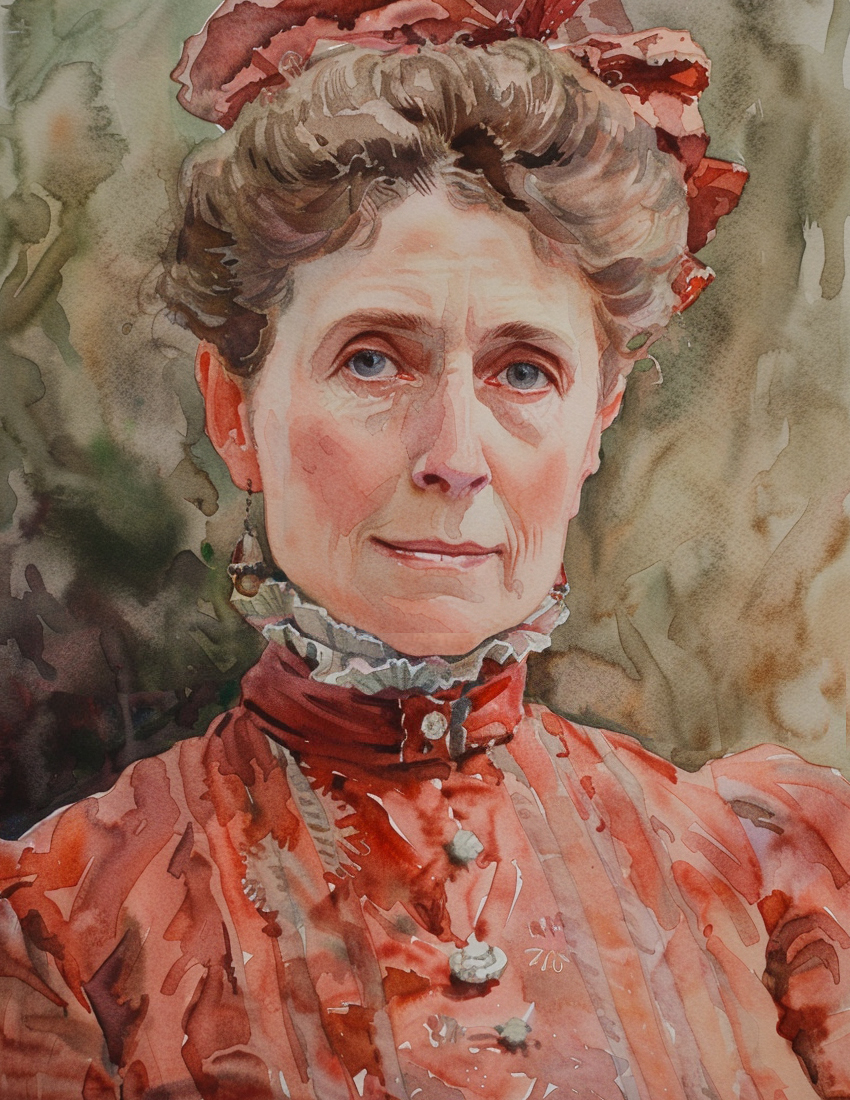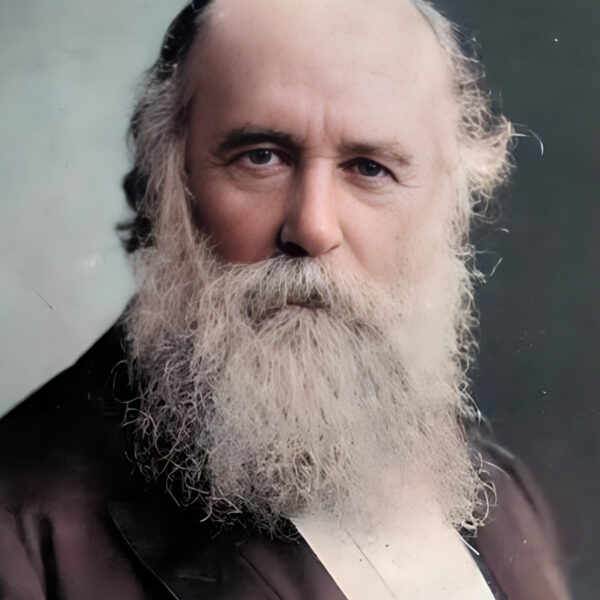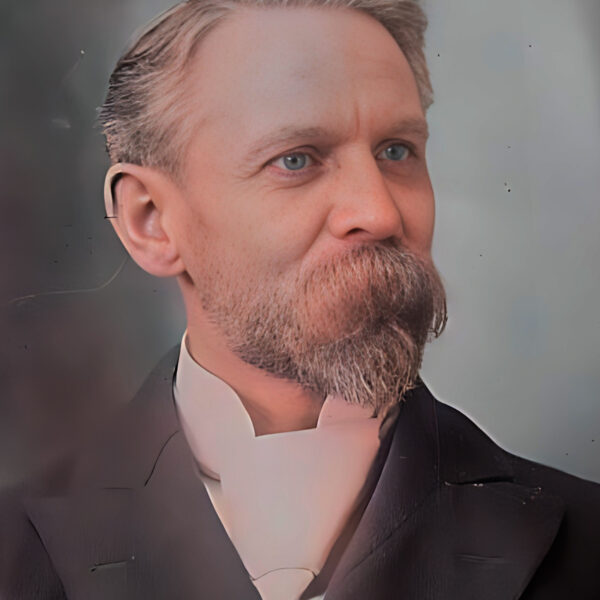Born: November 27, 1862, Bloomfield, IA (birth name: Sarah Addison Pollard).
Died: December 20, 1934, New York City.
Buried: Elmwood Cemetery, Fort Madison, IA.
Adelaide Addison Pollard

Editor’s note: No known photo of Adelaide exists that I can find. Images on the Internet erroneously attribute Adelaide Anne (‘Mary Berick’) Procter (1825-1864), poet, hymn writer and radical women’s activist to our Adelaide. Similar name but a different person a continent apart. Here I’ve created a watercolor representation of Adelaide using AI.
Hymns by Adelaide Pollard
Editor’s note: Read Sanford’s Wikipedia page for a shocking dive into the craziness of cultish early 1900’s behavior. It’s quite the read! I would love to know more about Adelaide’s involvement with him.
“It really doesn’t matter what you do with us, Lord, just have your way with our lives.” These simple words from an elderly woman’s prayer would soon become the foundation for one of Christianity’s most beloved hymns of surrender: Have Thine Own Way, Lord. But the woman who heard that prayer and transformed it into timeless verse was no ordinary believer. Adelaide Addison Pollard lived what her contemporaries called “the life of a mystic,” a soul so yielded to God’s will that she seemed to dwell on spiritual heights few others could comprehend.
Born Sarah Addison Pollard on November 27, 1862, in Bloomfield, Iowa, she would eventually choose to go by Adelaide, a name she found more to her liking than the one given at birth. This personal transformation of identity, whenever it occurred in her journey, hinted at the deeper spiritual metamorphosis that would define her entire life. From her earliest days, Adelaide displayed an intensity of Christian devotion that set her apart, even in an era when faith was woven into the fabric of daily life.
An Education in Faith and Learning
Adelaide’s hunger for knowledge matched her spiritual fervor. She studied in Iowa and Indiana, received training in elocution and physical culture in Boston, and even attended the renowned Moody Bible Institute in Chicago. This broad education equipped her not just with academic knowledge, but with the tools to communicate God’s truth effectively. During the 1880s, she taught at several girls’ schools in Chicago, but her heart was drawn beyond the classroom walls.
Soon, Adelaide became an itinerant Bible teacher, traveling from place to place with nothing but her deep knowledge of Scripture and an unshakeable faith in God’s power. Those who encountered her during these early ministry years consistently described her in the same terms: “saintly,” “remarkable,” and “wholly devoted.” Yet there was something else about Adelaide that both attracted and mystified people, a quality that would eventually earn her the reputation of living like a true mystic.
Dancing on the Edge of the Supernatural
In the late 1890s, Adelaide’s spiritual journey took her into territory that most conventional believers would never dare explore. She became involved with John Alexander Dowie, a prominent and controversial evangelist who led a powerful faith-healing movement. Dowie had founded “Zion City” in Illinois and claimed prophetic authority, even styling himself as a modern “Elijah.” For Adelaide, this wasn’t simply about attending meetings. She threw herself completely into Dowie’s ministry, even playing a portable organ in his open-air healing services.
It was during this time that Adelaide experienced what she believed to be a miraculous intervention from God. She suffered from diabetes, a serious condition in an era when medical treatments were limited. Yet through prayer at Dowie’s services, Adelaide testified that she was completely healed of the disease. This personal encounter with divine healing wasn’t just a testimony for her. It became a cornerstone of her faith, shaping her belief that God actively intervenes in the natural world for those who trust Him completely.
Friends and observers saw in Pollard a woman deeply attuned to the supernatural dimension of faith, earnest in prayer, and unafraid to seek God’s power beyond the ordinary. Her willingness to engage in such miraculous-focused ministry set her apart from more traditional religious teachers, contributing to her growing reputation for mysticism.
Into the Kingdom of the Extreme
Adelaide’s appetite for the supernatural led her next to Frank Weston Sandford, an evangelist who made even Dowie seem conventional. Sandford led a fringe apocalyptic holiness sect in Maine called “The Kingdom,” where followers lived in anticipation of Christ’s imminent return. The group promoted unusual doctrines like British Israelism, the belief that Anglo-Saxon peoples were descendants of the ten lost tribes of Israel. Sandford’s followers aimed to “live in the supernatural,” constantly seeking fresh revelations from the Holy Spirit as they prepared for the Second Coming.
For a time, Adelaide immersed herself in this intense, prophetic atmosphere. While it’s unclear how fully she embraced all of Sandford’s teachings, her involvement suggests she was drawn to the deepest mysteries of faith, unafraid to explore spiritual territories that others found too radical. During this period, she encountered what sources describe as “extreme texts,” radical interpretations of Scripture and prophecy that existed far outside mainstream Christianity. These may have included elaborate end-times prophecies and British-Israelite literature that promised to unlock God’s hidden plans for humanity.
Hymnologist Kenneth Osbeck notes that Pollard’s association with Sandford’s circle coincided with a crucial period in her life, suggesting her personal spiritual journey was being forged amidst apocalyptic expectations and intense soul-searching. Her interest in such material indicates a yearning to penetrate the deeper, even hidden, spiritual truths of her day. These influences further explain why contemporaries began to regard her as a “mystic” in character.
When Dreams Shatter and Faith Deepens
It was around 1901-1902, while she was still connected to Sandford’s apocalyptic circle, that Adelaide felt a powerful calling to serve as a missionary in Africa. Here was a woman who had witnessed miraculous healings, studied prophetic mysteries, and lived on the cutting edge of supernatural Christianity. Surely God would open this door for her. Adelaide threw herself into fundraising with the same intensity she brought to everything else, determined to reach the mission field through her own efforts.
But the door remained stubbornly closed. Month after month, Adelaide watched her African dreams slip away as the necessary funds failed to materialize. For someone accustomed to seeing God move in miraculous ways, this disappointment cut deeply. The woman who had experienced divine healing and sought God’s mysteries now found herself face-to-face with His silence, her heart “distressed” and discouraged.
The Potter’s House
In 1902, during this season of crushing disappointment, Adelaide attended a prayer meeting that would change not only her life but the lives of millions who would sing her words in years to come. As she sat listening to the prayers around her, an elderly woman spoke words that pierced Adelaide’s discouraged heart: “It really doesn’t matter what you do with us, Lord, just have your way with our lives.”
The simplicity of that prayer stood in stark contrast to all the elaborate prophecies and complex doctrines Adelaide had been studying. Here was truth stripped down to its essence: complete surrender to God’s will, whether that will brought triumph or disappointment, healing or suffering, open doors or closed ones.
Returning home that evening, Adelaide’s mind turned to Jeremiah 18:3-6, where the prophet watches a potter at work:
“Then I went down to the potter’s house, and, behold, he wrought a work on the wheels. And the vessel that he made of clay was marred in the hand of the potter: so he made it again another vessel, as seemed good to the potter to make it. Then the word of the LORD came to me, saying, O house of Israel, cannot I do with you as this potter? saith the LORD. Behold, as the clay is in the potter’s hand, so are ye in mine hand, O house of Israel.”
In that moment of meditation, all of Adelaide’s mystical seeking, all her encounters with the supernatural, and all her disappointed dreams coalesced into perfect clarity. The verses of “Have Thine Own Way, Lord” poured out of her in one sitting:
Have Thine own way, Lord! Have Thine own way!
Thou art the potter; I am the clay.
Mold me and make me after Thy will,
While I am waiting, yielded and still.
The hymn’s message of total surrender to God’s will was perfectly in keeping with Pollard’s mystical bent, reflecting a soul yielded completely to the Divine Potter. Her mystical inclinations, her seeking of God’s will in all things, even extreme circumstances, had directly fueled this creative masterwork.
A Life of Mystical Devotion
Though her African missionary dreams had been deferred, Adelaide’s heart for ministry never wavered. She eventually taught at the Missionary Training School in Nyack, New York, and when a door to Africa finally opened just before World War I, she seized the opportunity for a brief service there before the war forced her to flee to Scotland. Returning to America, she continued preaching throughout New England despite failing health, her mystical reputation growing with each passing year.
Adelaide never married, choosing instead to devote herself wholly to God’s service. She held no worldly ambitions and sought no earthly recognition, even for her prolific hymn writing. Over the course of her life, she penned more than 100 hymns and gospel songs, most published simply under her initials, “A.A.P.” A fellow hymnist noted that Pollard “never wanted any recognition” for her work. She was content to remain obscure as long as God was glorified. This self-effacing devotion, combined with her involvement in miraculous and prophetic ministries, gave her an almost other-worldly reputation among those who knew her.
In her later years, Adelaide’s spiritual hunger only intensified. Dr. Carlton Young, editor of the Companion to the United Methodist Hymnal, noted that “she was attracted to extreme texts, living the life of a mystic.” While the specific nature of these texts remains hidden in history, they likely included the kind of intense prophetic and holiness writings that only the most spiritually adventurous souls would dare explore. Given her earlier connection to Sandford, she might have continued reading literature on prophetic chronology or the mysteries of Israel in prophecy, the kind of fringe Bible interpretations that revealed her fearless desire to experience all of God’s truth, even at risk of being labeled extreme herself.
Her mysticism was evidently a deeply personal and profound aspect of her faith, coloring how she prayed, ministered, and wrote songs. She sought a direct, living encounter with God’s will and voice, much like the great mystics who prize spiritual experience over worldly reason.
The Potter’s Final Touch
Adelaide Addison Pollard died as she had lived, completely devoted to her Father’s business. In December 1934, at age 72, she was en route to speak at a Christmas prayer meeting when she collapsed in a train station. She passed away soon after from a ruptured appendix, never making it to that final engagement. To the very end, she was about the work God had given her to do.
Her legacy lives on chiefly through “Have Thine Own Way, Lord,” which George Stebbins set to music in 1907. The hymn quickly became a beloved prayer of submission for believers around the world. In those timeless lyrics that include “Hold o’er my being absolute sway! Fill with Thy Spirit till all shall see Christ only, always, living in me,” we hear Adelaide Pollard’s own heartbeat, the cry of a mystic who wanted “Christ only, always” to be seen in her.
The Mystery of True Surrender
Today, over a century after its composition, “Have Thine Own Way, Lord” continues to inspire believers facing their own closed doors and shattered dreams. Adelaide Pollard’s life demonstrates that the term “mystic” need not imply bizarre visions or heretical ideas, but rather a radically intimate walk with God. She took to heart the biblical image of clay in the divine Potter’s hands, trusting Him to mold her completely according to His perfect will.
Those who called her a mystic recognized that Adelaide Pollard dwelt on a spiritual plane of total trust and holiness that truly set her apart. She stepped outside the ordinary bounds of denominational religion, embracing divine healing, prophetic expectation, intense prayer, and complete consecration to God’s purposes. Though history may have obscured some details of her “extreme” spiritual pursuits, what remains crystal clear is the example of a life wholly devoted to God’s purposes. Even when that devotion led her through disappointment and into uncharted spiritual territories, she never lost sight of the simple truth that had transformed her heart: it really doesn’t matter what God does with us, as long as He has His way with our lives.
In a world that often values self-reliance and personal ambition above all else, Adelaide Pollard’s hymn stands as a gentle yet powerful call to relinquish control and allow the Master Potter to have His way. As we sing her words, we join our voices with the countless believers who have found comfort, strength, and guidance in this simple, profound prayer born from the heart of a woman who truly understood what it means to be clay in the Potter’s hands.



